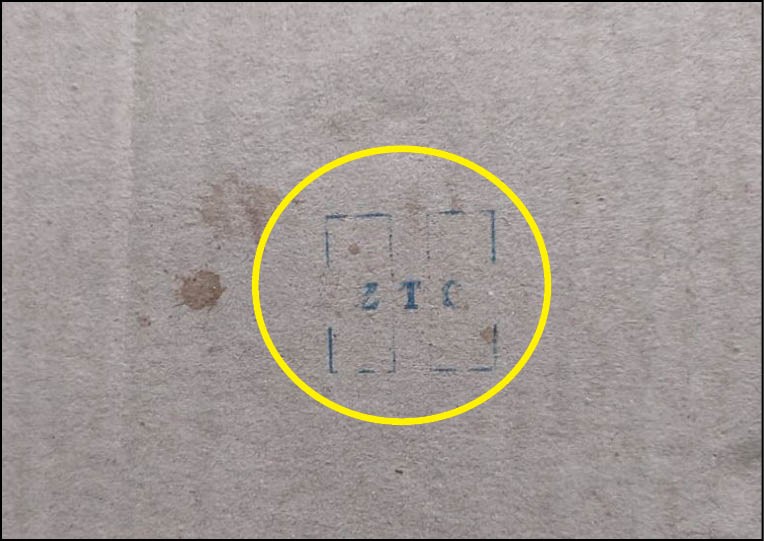An egg carton bearing the official seal of the ZTC – Zunheboto Town Council. While the council claims the stamped cartons were introduced to stabilise prices and streamline supply, the move has sparked controversy, with allegations of coercion, lack of transparency, and syndicate-like control. (Morung Photo)

Morung Express News
Zunheboto | May 4
The Zunheboto Town Council (ZTC) is facing serious allegations of imposing an informal monopoly over the district’s egg supply chain, even as it defended the move as a public service measure aimed at stabilising prices and streamlining distribution.
According to multiple vendors and sources, the issue dates back to October–November 2024, when the ZTC reportedly issued unwritten directives mandating that all egg vendors and wholesalers in Zunheboto procure eggs exclusively from the council.
Charges of coercion
Although eggs from other sources have not been officially banned, vendors alleged the council has “strictly prohibited” sourcing from elsewhere. Those defying the directive reportedly faced verbal warnings, fines, and other penalties.
Vendors claimed that while no formal order or legal notification was issued, enforcement was carried out through “pressure and coercion.” To ensure compliance, the ZTC introduced stamped cartons for its distributed eggs, now widely seen across town shops.
Several vendors, speaking anonymously, said they were never given written communication but were verbally told to buy only from the ZTC. Some also reported fines without official receipts or documentation.
Many expressed frustration, claiming the quality of eggs had compromised. “Earlier, we used to get a variety of eggs from different sources, but now we are forced to sell only what the council supplies, which are of lower quality,” one vendor said.
While prices have slightly decreased, the eggs are reportedly of “super medium” quality, leading to customer dissatisfaction.
Consumers raise questions
Consumers are also raising their voices against the directive
Many held that the ZTC was exerting syndicate-like control, limiting public’s right to choose. “Today it’s eggs; tomorrow it could be mustard oil or rice. Where does this end?” asked one resident.
Others feared the town’s free market system is being eroded under the guise of price stabilisation.
There was concern over the lack of public notice and some recalled early supply shortages when the policy took effect.
Critics have also cited potential violations of Article 19(1)(g) of the Indian Constitution, which guarantees the right to practise any profession or carry on any occupation, trade, or business as well under anti-competitive behaviour as defined by the Competition Act, 2002.
ZTC defends move
The ZTC refuted the allegations, stating that a resolution was passed on October 9, 2024, to centralise egg supply after failed attempts to negotiate fair prices with private suppliers.
It maintained that the move aimed to stabilise prices and said anyone can supply eggs with a permit and at the council’s fixed rate until market conditions normalise.
An official order or notification was issued regarding the new policy, a Councillor said. However, while the Councillor told The Morung Express that the order had been circulated, vendors, wholesalers, and consumers claimed they were unaware of any such communication. The Councillor produced handwritten meeting minutes as evidence.
The ZTC also claimed its actions were based on complaints from vendors and wholesalers over taxes levied by various Naga Political Groups.
By streamlining supply, the ZTC pointed out, it had eliminated additional charges and insisted it was not profiting.
Instead, the council urged the public to compare egg prices with other districts like Kohima, Dimapur, and Mokokchung, asserting that prices were similar and it was not earning a profit.
“We are doing this to stabilise the price in the market. We are not here to make any money,” asserted a ZTC member, adding that egg prices can vary depending on weather conditions, and dismissed the allegations as mere “idle talk.”
“In Zunheboto, we have many issues. Focusing on such a trivial matter is pointless,” said Herato Sukhalu, Chairperson of the ZTC, citing the sale of Gutkha (Talab/Shikhar) above the maximum retail price.
“Instead of addressing and complaining about such serious issues, why raise concerns that have no real meaning?” he countered. “If necessary, we are ready to resolve the issue amicably in our office with the complainants and find a solution.”
Regarding egg size, the council clarified that the eggs are supplied by an external company and their size varies—sometimes small, sometimes large. Of the five standard sizes, Zunheboto is currently receiving size 4 and 5 eggs.
Despite the council’s explanations, many vendors and consumers remain sceptical, arguing that a public-serving body like the ZTC should not function like a private syndicate—especially in the case of essential commodities like eggs.
They called for the immediate restoration of the open market system and greater transparency in the council’s operations.






